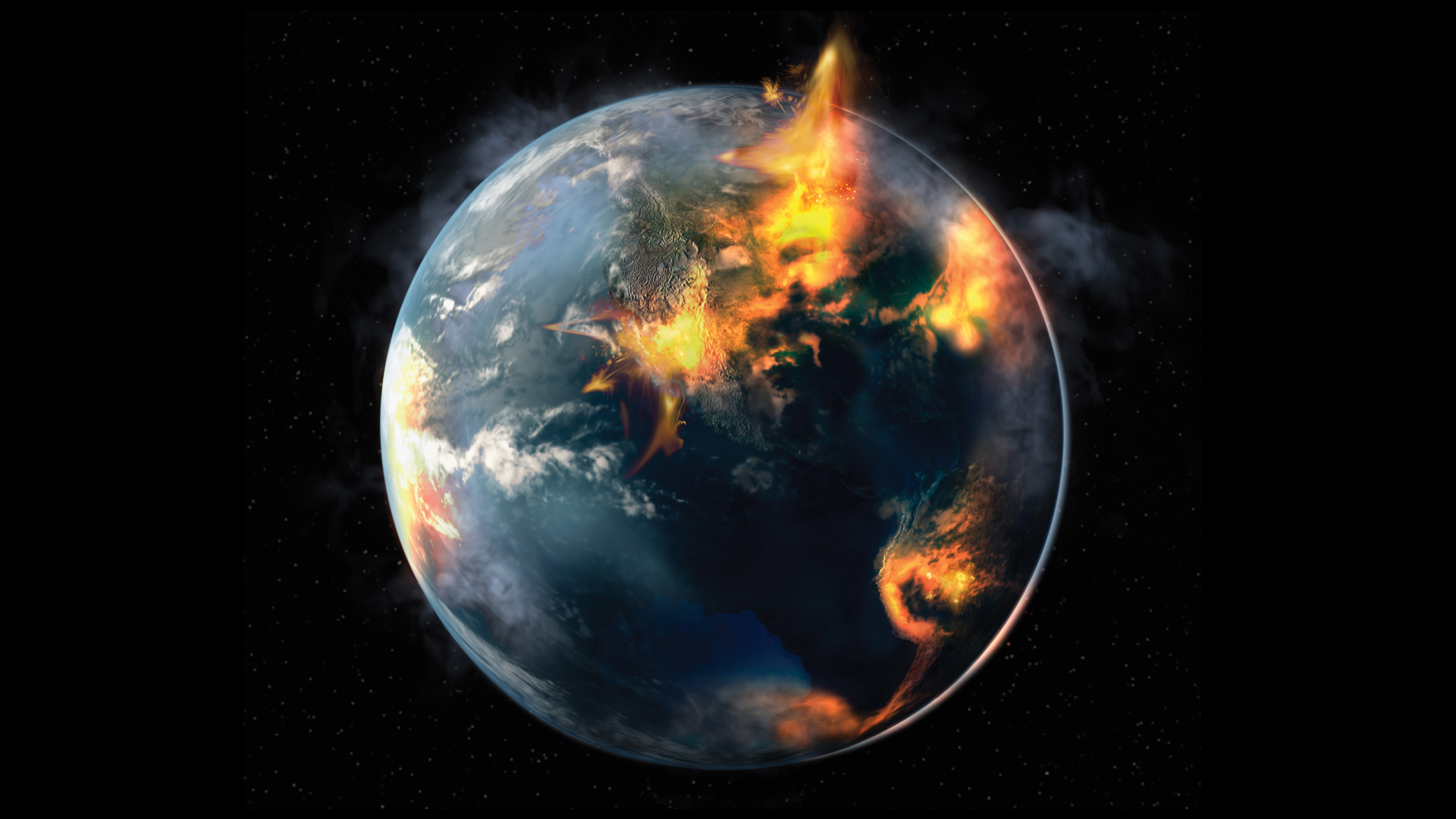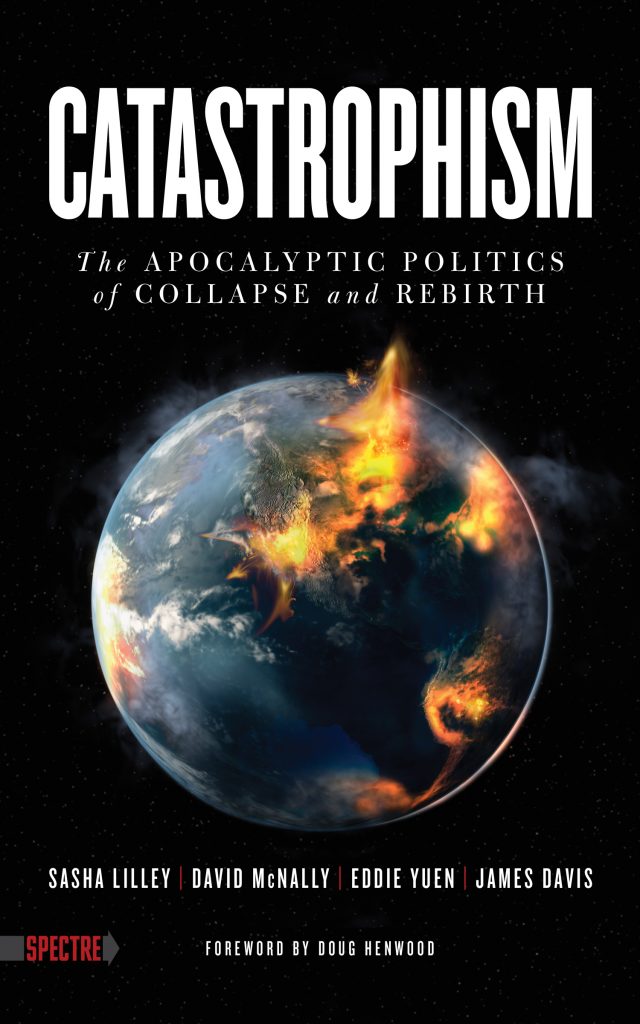By Dan Sharber
Red Wedge Magazine
December 10th, 2012
Dan Sharber takes a look at how and why some musicians are obsessed with the apocalypse.
So I read this book recently called Catastrophism: The Apocalyptic Politics of Collapse and Rebirth put out last month by PM Press. It’s about political tendencies that have an aspect of end-of-the-world gloom and doom. It covers a various range of topics over its short length — from the environmental movement’s attempts to mobilize people through fear of the impending global collapse to right-wing catastrophists like Anders Breivik, who fear the end of the world is coming fast and multi-culturalism is the cause. it’s a good and very interesting book that I highly recommend.
But what made me think about writing something about it here is twofold. One, I’ve been listening to Bob Dylan a ton recently and his song “Let Me Die In My Footsteps” had been on my mind.
This song is about impending nuclear war and Bob’s desire to not go into the bomb shelters but to die in his footsteps above ground.
“I will not go down under the ground
’Cause somebody tells me that death’s comin’ ’round
An’ I will not carry myself down to die
When I go to my grave my head will be high
Let me die in my footsteps
Before I go down under the ground”
Isaac Brock
The second reason was that I recently pulled out Modest Mouse’s Good News For People Who Love Bad News.
I had not listened to this record in awhile and I remember when it came out just being ‘meh’ about it. But when I listened to it yesterday I realized how kick ass a record it is. It is not my favorite Modest Mouse record but even the fourth best MM record is still better than tons of other records out there.
But what got me this time was the song “Bury Me With It.” Especially this part:
“Well as sure as planets come I know that they end
And if I’m here when that happens just promise me this my friend
Please bury me with it
I just don’t need none of that Mad Max bullshit”
So now what does all this have in common you ask? Good question.
Well, the book posits in one of the essays that increased fear and a thorough appreciation of the level of destruction we’re seeing in the world right now doesn’t actually lead to people getting more involved in fighting against climate change. In fact in a lot of cases the opposite is true. People retreat and feel hopeless to make any change.
And while many “don’t need none of that Mad Max bullshit,” instead of trying to fight for a better world, many are more likely to simply want to “die in their footsteps.”
These songs do differ a little in fundamental ways though. Dylan’s song encourages the listener to get out into the country and see nature while you can so that you may die on your own terms. And while he does say that he would “throw all the guns and the tanks in the sea” this is predicated on him having “rubies and riches and crowns,” or put another way, power.
Dylan’s song is fatalist because he believes that we have no power to change these things and we should simply try to enjoy what little time we have left and not get buried by the fear. The sentiment at the end is good but the demoralization inherent in having no power to change things is demobilizing.
If you’re not rich enough to throw the tanks in the sea then just check out and get ready to die on your own terms.
To me this really relates to the theme of Catastrophism. For Dylan, the immense fear and almost incomprehensible destruction associated with nuclear war did not inspire action but caused crippling apathy and a move away from collective solutions into personal attempts to live right. While this of course is not true of all people historically, it is part of the point of the song.
Even when anti-nuclear activists hoped that the fear would spark action, the opposite was equally likely (and attractive to many).
Modest Mouse’s song is also about enjoying what little time we have on this planet but Isaac Brock takes this even further.
It is very pointed that the first verse has the line “I probably really should’ve been at work.” This song is not simply about the destruction of the planet (as the verse at the top of this deals with) but also about the stultifying nature of work in our modern capitalist system. Or as Karl Marx put it:
“[T]he fact that labor is external to the worker, i.e., it does not belong to his intrinsic nature; that in his work, therefore, he does not affirm himself but denies himself, does not feel content but unhappy, does not develop freely his physical and mental energy but mortifies his body and ruins his mind. The worker therefore only feels himself outside his work, and in his work feels outside himself. He feels at home when he is not working, and when he is working he does not feel at home. His labor is therefore not voluntary, but coerced; it is forced labor. It is therefore not the satisfaction of a need; it is merely a means to satisfy needs external to it. Its alien character emerges clearly in the fact that as soon as no physical or other compulsion exists, labor is shunned like the plague.”
Anyone that has ever worked any shitty job knows these words to be true. Marx’s philosophy though is based on action. He wrote about this bitter alienation to point people to how things could be better. To how things don’t have to be this way. And how we could and should work together to change them.
Those familiar with Modest Mouse know that Brock peppers many of his songs with references to jobs, getting jobs, getting fired from jobs, bosses, etc (for some examples see: “Custom Concern“, “Float On“, “Third Planet“, “Wild Pack Of Family Dogs” etc). Also there is a strand of anti-suburban sprawl environmentalism in some songs (again “Custom Concern” and also “Novocain Stain“).
But instead of Brock looking to inspire some sort of action, again there is the desire to check out. And shoot guns at a mound of dirt. And when you can no longer do that or any of the other simple (though wholly unsatisfying) escapist activity, it’s time to die.
“Please, bury me with it.”
Despite the best intentions of those who fight for a better world for all of us, the politics of fear and imminent destruction are not helpful. I am, of course, not chiding Brock or Dylan on this but merely using their songs for examples. There are larger issues here about the context within which these songs were written but, while interesting, I don’t have time to get into those here.
The book does a great job of pointing this out and where Brock says he’s not interested in that “Mad Max bullshit,” the intro essay in Catastrophism puts it a different way:
“Dystopia is for losers.”
And while I think we can all agree on that, fear is not a good motivator. We desperately need a politics of hope; imbued with revolutionary enthusiasm. Now more than ever.
Anyway, jam out to the songs and read that book. Then instead of getting overwhelmed and checking out, get involved in making the world a better place.
We don’t need rubies or crowns because we have numbers. Remember the words of Percy Shelley:
“Rise like Lions after slumber
In unvanquishable number —
Shake your chains to earth like dew
Which in sleep had fallen on you —
Ye are many — they are few.”
Dan Sharber is an activist and socialist in Texas. He guest-writes at the music blog 70 Day Weekend (where this article first appeared), and recently spoke on environmental disaster in capitalism.
Back to Sasha Lilley’s Author Page | Back to David McNally’s Author Page | Back to Eddie Yuen’s Author Page | Back to James Davis’s Author Page







